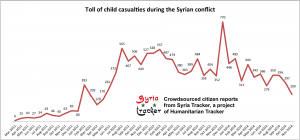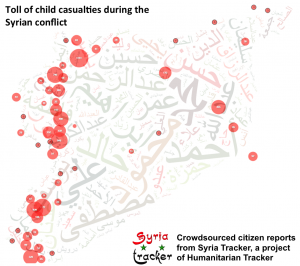Guest blog post by Hend Alhinnawi & Taha Kass-Hout, Humanitarian Tracker (Full blogger bios following the post)
This is the story of the Syrian conflict, as told by its citizens living within its borders.
In early Spring 2011, protests were spreading and reports of unrest in Syria made headlines. However, with the absence of local and international media coverage, it was difficult to understand the situation and what was happening. Enter Syria Tracker. A few weeks after the conflict in Syria broke out, in partnership with Ushahidi, we launched Syria Tracker. A small volunteer-based effort that used technology to help citizens in Syria report what was happening to and around them. People could submit reports, videos and pictures through Syria Tracker’s website, Twitter or e-mail. Like many other events where crowdsource has been used, we estimated that this effort would go on for a few weeks, and perhaps a couple of months.
Four years later, reports are still flooding in covering everything from human rights violations (such as, killing, torture, rape, etc.), to disease outbreak and relief needs.
According to the United Nations Office for the Coordination of Humanitarian Affairs (UNOCHA), Syria is the biggest humanitarian crisis in the world today.
Children, often the smallest victims in any conflict continue to be one of the primary targets in Syria. Since March 2011, Syria Tracker has documented approximately 14k confirmed killings of children under the age of 18 obtained from its crowdsourced reports. The stolen futures of Syria’s innocent children ravages on as the conflict enters its fifth year.
As we think of safer cities where children play, go to school, thrive and grow. In Syria, playgrounds have been replaced with cemeteries and schools have turned into torture chambers.
 It is not just the killing that is bone chilling, but also the methods of killing, which are equally alarming. Data from Syria Tracker, a project of Humanitarian Tracker, state that more than 75% of children were killed by explosive weapons, including artillery, missiles, or air bombardment. Over 755 children were executed by beating, stabbing, burning, torture, or sniper, including more than 300 babies (under 2) killed by small arms. To date, over 500 children died from sniper attacks.
It is not just the killing that is bone chilling, but also the methods of killing, which are equally alarming. Data from Syria Tracker, a project of Humanitarian Tracker, state that more than 75% of children were killed by explosive weapons, including artillery, missiles, or air bombardment. Over 755 children were executed by beating, stabbing, burning, torture, or sniper, including more than 300 babies (under 2) killed by small arms. To date, over 500 children died from sniper attacks.
 To work towards a safer city for everyone, especially children, it is important to understand how crowdsourced data gave people a voice. A turn to tell their stories using their own words and pictures. Crowdsourced data can also give a different look at the children killed. For example, more than twice as many boys have been killed as girls. This can indicate civilian targeting. What’s more powerful is the concept that these reports were sent by ordinary citizens who wanted to tell the world their stories.
In a conflict that has killed more than 120,000 (according to Syria Tracker’s crowdsourced data), approximately 11.5% of ALL documented killings by Syria Tracker are children, with at least 5% of children killing being targeted.
To work towards a safer city for Syria’s children means to once again fill the playgrounds with laughter, schools with eager learners and futures with hope and potential.
To work towards a safer city for everyone, especially children, it is important to understand how crowdsourced data gave people a voice. A turn to tell their stories using their own words and pictures. Crowdsourced data can also give a different look at the children killed. For example, more than twice as many boys have been killed as girls. This can indicate civilian targeting. What’s more powerful is the concept that these reports were sent by ordinary citizens who wanted to tell the world their stories.
In a conflict that has killed more than 120,000 (according to Syria Tracker’s crowdsourced data), approximately 11.5% of ALL documented killings by Syria Tracker are children, with at least 5% of children killing being targeted.
To work towards a safer city for Syria’s children means to once again fill the playgrounds with laughter, schools with eager learners and futures with hope and potential.
Taha Kass-Hout, MD, MS,is the Founder of HumanitarianTracker. Taha is a recognized leader and has been a leader in the fields of health and informatics for nearly two decades. He is credited with a number of humanitarian innovations. In 2010, for example, the Thomson Reuters Foundation used the InSTEDD Riff open source platform (he designed with Nicolas di Tada) to communicate with survivors of the earthquake in Haiti. Free text messages sent to mobile phones allowed the people of Port Au Prince to receive the latest disaster-relief information. Taha holds a Doctor of Medicine and a Master of Science (Biostatistics) from the University of Texas. In addition, he has had clinical training at Harvard's Beth Israel Deaconess Medical Center in Boston, MA and the University of Texas Health Sciences Center at Houston. Hend Alhinnawi, MA, is the Co-Founder of HumanitarianTracker where she engages and informs the public by promoting the importance of information sharing and public diplomacy to media entities, donors, stakeholders and policymakers; such as USAID, Department of State, United Nations and the White House. Hend has domestic and international work experience in highly visible and dynamic positions with United Nations World Health Organization and World Food Program. She spent over five years working in Africa and the Middle East. During her time with the United Nations, she successfully managed and led fundraising initiatives which generated the resources needed to support programs relating to education, women’s rights, refugees and underserved communities, while building partnerships with key individuals, stakeholders, local and international organizations. Poised and assured in interactions with individuals at all levels. Motivated and resourceful in initiating and completing projects, while effectively multi-tasking. The common factor in all her professional experiences, is her ability to establish, build and successfully maintain long-term relationships. Hend received an M.A. in Public Diplomacy from University of Southern California, and B.A. in International Development, Minor: Middle East and North African Studies from University of California Los Angeles. About Humanitarian Tracker: A non-political and non-religious crowdsourcing forum that offers tools for “citizen journalists” to tell their stories via text, photos and video submissions. Contributors have access to training tools and methodology for sharing eye-witness accounts of human rights violations, natural disasters, and the spread of disease. Current projects being tracked include ebola screening and crowdsourcing the spread of disease and disasters such as the current crisis in Syria. The International Federation of Red Cross (IFRC) has cited Syria Tracker, the flagship project of Humanitarian Tracker, as the longest-running crisis maps. Both USAID and the US Office for Foreign Disaster Assistance continue to integrate Syria Tracker data into their own official crisis maps and information products. Humanitarian Tracker’s data mining tools incorporate news from blogs, social media and official reports to form a live map of what is happening in the world. Accounts which are submitted by citizens are verified against other citizen reports or official sources in order to ensure accuracy. Accuracy, along with identity protection of anonymous citizen reporters, particularly in war zones, are of utmost importance to the organization.
 It is not just the killing that is bone chilling, but also the methods of killing, which are equally alarming. Data from Syria Tracker, a project of Humanitarian Tracker, state that more than 75% of children were killed by explosive weapons, including artillery, missiles, or air bombardment. Over 755 children were executed by beating, stabbing, burning, torture, or sniper, including more than 300 babies (under 2) killed by small arms. To date, over 500 children died from sniper attacks.
It is not just the killing that is bone chilling, but also the methods of killing, which are equally alarming. Data from Syria Tracker, a project of Humanitarian Tracker, state that more than 75% of children were killed by explosive weapons, including artillery, missiles, or air bombardment. Over 755 children were executed by beating, stabbing, burning, torture, or sniper, including more than 300 babies (under 2) killed by small arms. To date, over 500 children died from sniper attacks.
Taha Kass-Hout, MD, MS,is the Founder of HumanitarianTracker. Taha is a recognized leader and has been a leader in the fields of health and informatics for nearly two decades. He is credited with a number of humanitarian innovations. In 2010, for example, the Thomson Reuters Foundation used the InSTEDD Riff open source platform (he designed with Nicolas di Tada) to communicate with survivors of the earthquake in Haiti. Free text messages sent to mobile phones allowed the people of Port Au Prince to receive the latest disaster-relief information. Taha holds a Doctor of Medicine and a Master of Science (Biostatistics) from the University of Texas. In addition, he has had clinical training at Harvard's Beth Israel Deaconess Medical Center in Boston, MA and the University of Texas Health Sciences Center at Houston. Hend Alhinnawi, MA, is the Co-Founder of HumanitarianTracker where she engages and informs the public by promoting the importance of information sharing and public diplomacy to media entities, donors, stakeholders and policymakers; such as USAID, Department of State, United Nations and the White House. Hend has domestic and international work experience in highly visible and dynamic positions with United Nations World Health Organization and World Food Program. She spent over five years working in Africa and the Middle East. During her time with the United Nations, she successfully managed and led fundraising initiatives which generated the resources needed to support programs relating to education, women’s rights, refugees and underserved communities, while building partnerships with key individuals, stakeholders, local and international organizations. Poised and assured in interactions with individuals at all levels. Motivated and resourceful in initiating and completing projects, while effectively multi-tasking. The common factor in all her professional experiences, is her ability to establish, build and successfully maintain long-term relationships. Hend received an M.A. in Public Diplomacy from University of Southern California, and B.A. in International Development, Minor: Middle East and North African Studies from University of California Los Angeles. About Humanitarian Tracker: A non-political and non-religious crowdsourcing forum that offers tools for “citizen journalists” to tell their stories via text, photos and video submissions. Contributors have access to training tools and methodology for sharing eye-witness accounts of human rights violations, natural disasters, and the spread of disease. Current projects being tracked include ebola screening and crowdsourcing the spread of disease and disasters such as the current crisis in Syria. The International Federation of Red Cross (IFRC) has cited Syria Tracker, the flagship project of Humanitarian Tracker, as the longest-running crisis maps. Both USAID and the US Office for Foreign Disaster Assistance continue to integrate Syria Tracker data into their own official crisis maps and information products. Humanitarian Tracker’s data mining tools incorporate news from blogs, social media and official reports to form a live map of what is happening in the world. Accounts which are submitted by citizens are verified against other citizen reports or official sources in order to ensure accuracy. Accuracy, along with identity protection of anonymous citizen reporters, particularly in war zones, are of utmost importance to the organization.